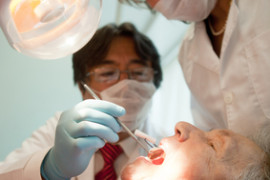Periodontal bacteria invade the cardiovascular system to incite inflammation and atherosclerosis, according to recent research published in Circulation.
The study examined the effect of polymicrobial infection in ApoE-null mice after a period of 12 and 24 weeks. Mice were infected with four of the most comment virulent oral pathogens found in the oral microbiome: Porphyromonas gingivalis, Treponema denticola, Tannerella forsythia, and Fusobacterium nucleatum.
Characterizing the bacterial infection as “invasive,” researchers noted that the bacteria traveled through the blood stream to the heart and aorta and contributed to significantly increased risk factors, including oxidized LDL, cholesterol, triglycerides, and aortic plaque formation. This chronic infection also induced marked changes in inflammatory cytokines and chemokines.
While the American Heart Association does not yet call the relationship between periodontal disease and cardiovascular disease causal, the impact these pathogens exert on systemic inflammation and atherosclerosis is undeniable. Just last week, a study found both cariogenic and periodontopathic bacteria in 90% of patients with heart valve disease. A 2013 study in Circulation concluded that up to 50% of heart attacks were triggered by oral bacteremia—bacteria in the bloodstream.
Each of the bacteria used in this study has been associated with systemic health effects; however, these bacteria are not only able to inflict harm individually—they also work together to weaken the body’s immune response.
The oral-systemic health connection is the tipping point of healthcare. It appears that every inflammatory disease is hugely affected by oral infection and inflammation. This study, among thousands of others, shows us that there is a medical need to address the oral microbiome as a component of disease prevention and management.



